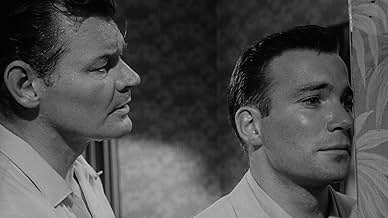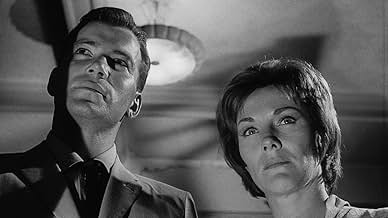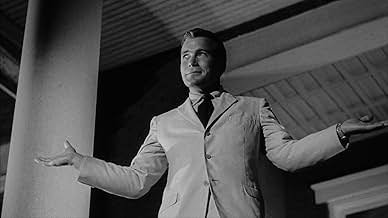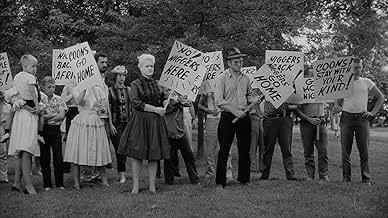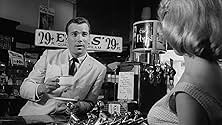Un hombre con un reluciente traje blanco llega a una pequeña ciudad del sur en vísperas de la integración. Él se llama a sí mismo un reformador social, pero lo que hace es provocar problemas... Leer todoUn hombre con un reluciente traje blanco llega a una pequeña ciudad del sur en vísperas de la integración. Él se llama a sí mismo un reformador social, pero lo que hace es provocar problemas, que pronto descubre que no puede controlar.Un hombre con un reluciente traje blanco llega a una pequeña ciudad del sur en vísperas de la integración. Él se llama a sí mismo un reformador social, pero lo que hace es provocar problemas, que pronto descubre que no puede controlar.
- Dirección
- Guión
- Reparto principal
- Bart Carey
- (as William Nolan)
- Jack Allardyce
- (as O.C. Ritch)
- Old Hotel Clerk
- (voz)
- (sin confirmar)
- Billy Lee
- (sin acreditar)
Reseñas destacadas
This is Corman's most painstakingly worked-out film, which is why it is so powerful, suggesting, like Lang, a set of mathematical propositions that seem simple but, add up to a theorem that seems to negate mathematical principles of logic, order etc. As in a Lang film, there is no 'hero' to root for - the lead here is a sinister right-winger linked to the KKK who arrives in an archetypal Southern town to stir up race hatred. He is given the conventional Hollywood hero treatment: the opening credits set up his point of view, establishing his way of looking at the world.
But even over these credits, Corman confuses us. At first we think he's a solitary figure, it is him alone we see entering the town and looking at it. Then he comes out with a woman and child, and we assume he's a family man, but that turns out to be wrong too. So, in these opening scenes we are presented with a lead character in the conventional manner, but, unconventionally, we are unable to get a grip on him.
Similarly, in spite of the title and the menacing opening music, Cramer's good manners and charm continue to suggest him as a hero, even though he is trying to stir up racist feeling, especially when compared to the next significant male character, a loud braggart who appears to be raping his nymphomaniac wife. In this first third, there are no sides drawn, we might almost be watching a racist film, such is Cramer's conventional heroic status. He even seems a movie star, with his dark shades and good looks, which Corman plays on ironically in the scenes of demagogary and when his 'fans' protest his jailing.
Like Lang, Corman switches point of view disturbingly and decisively. This opening out of point of view makes clear the issues, and in a way that conventional Hollywood cinema of the time could not conceive. The reason films like this were considered 'B' or exploitation is because they were telling truths that official Hollywood didn't even know existed. How many contemporary Hollywood films were even dealing with these issues, never mind as provocatively and intelligently as this one? When they finally got round to it, it was cosy liberal kramergloop.
There is no flip solution here - the moral centre is a moderate racist who is nearly killed for his growing ethical awareness (the newspaper editor) - other liberals are shown to be almost criminally useless. Corman asks questions with no easy answers - how do you enforce progressive laws? how do you hold back a mob without becoming as reactionary as them? Cramer, influenced by Lenin as much as Hitler, makes his appeals to democracy and freedom, and Corman forces us to admit that he is right, to reconsider what we mean by these concepts. This is a stunning film, full of tense calm giving onto explosions of harrowing violence, with an insight into its roots in sexual neurosis, including a sequence where the KKK come into town like an invading army, a huge cross like a tank turret, ready to be burned; a lynch sequence as shocking as Huck Finn or 'The Ox-bow Incident'.
Along with the unusual, Langian clarity of the monochrome imagery, note the grids on or around Cramer - crossed telegraph wires, the bars of the hotel lobby etc. - culminating in the demand for the accursed rapist behind a grilled window, like a frothing beast; or the childlike immaturity of the racists, whose hatred centres around the school's swing. The frightening 'speech' scene, outside a monumental civic building, in Nuremberg-like lighting, is more potent than anything in 'All the King's Men'.
"The Intruder" is so harrowing, frightfully realistic and effective that had it gained the success and attention it deserved Corman today would be up there with names like Norman Jewison, Sidney Lumet, Milos Forman, John Schlesinger and other great film-makers of his generation!
The atmospheric use of real southern locations just adds to the drama, and the racism portrayed by many of the actors feels almost to close to comfort. One final note: Anyone who still considers William Shatner a grade-b actor should also try and get a hold of this film to witness a fine actor in good form.
Watch this if you can, one of the greatest unsung movies of the 1960's!
I know that this film didn't cost much to make because it was directed by Roger Corman, but if you didn't know that; you'd never have guessed. There are no big stunts in the film, but the production values are surprisingly high and the acting surprisingly good. The Intruder is bolstered by an excellent performance from William Shatner. Corman apparently blamed the poor box office run on Shatner - but I have no idea why! Shatner does a great job of providing a great portrait of his character - suitably slimy, yet obviously cowardly beneath his confidant public persona. Perhaps the best thing about this film is its simplicity. Bigger films such as American History X have attempted to make a point about racism with not as much success as Corman has here. The scenes that show the crowds really getting behind Cramer's words of hatred are poignant indeed, and the conclusion to the tale both makes a point about bigots and provides a suitable conclusion to Adam Cramer's character arc. Overall, The Intruder is one of the best and most though-provoking films on the tentative subject of racism that I have ever seen, and it comes highly recommended to all!
Extremely bold and brutally honest portrayal of race relations in the South in the early 60's when the film was made. By viewing it I can see it must have been way too inflammatory for its time. Yet, some parts of this flim made me kind of tense/uncomfortable. Therefore, I don't see it getting wide acceptance in today's politically correct world either.
Despite this, the film's theme and moral messages are ageless. The script is so intelligently written coupled with Shatner's convincing performance, I was not given impression that this is considered a "B" movie. OK, well maybe there are a few scenes that may indicate that but they are outnumbered by the compelling drama throughout the film. The final 5 to 10 minutes are particularly tense which may actually be hard to watch.
A commendable effort, I had no regrets in plucking down a few bucks to buy this flick.
Daring, bare bones, raw, insensitive, necessary, superb. And flawed. And terrific.
It's what a good movie strives to be--saying something, sucking you in, chewing you up, leaving you impressed and interested and glad.
Where to start? Rather than mention the main actor, it's better to say that here is a rare film, a low-budget black and white drama, that deals with racism in the early days of de-segregation directly. It mostly shows the bigoted South--the map on the wall implied Missouri, so it's not even the deep South of Alabama. When ten black children are told by Federal law to attend the white school, the town has largely and bitterly gone along. It's the law. But a troublemaker comes in to stir things up, and we see a caricatured but not so wrong impression of the worst sides of ordinary people who grew up thinking segregation was normal and good.
That actor? William Shatner, of Star Trek legend (beginning in 1966). Here he shows he can pretty much act. I say pretty much as a kind of compliment to the movie makers, especially the big force behind the film, its look and its theme, Roger Corman. Because this is no Brando or Newman coming in to really command the town, the movie, the racial injustice. That would be too impressive, and with Shatner we have something is almost what you picture really happening. The rest of the movie is no documentary, for sure, and so the need to be cinematic and theatrical is met. The cast is a gritty, drawling bunch of regular folk, and my guess is that Southerners didn't appreciate the typecasting. But I've lived in a small Southern town much like this one, and it is not so far from the truth. Simplified for the movie, but the general drift is there.
The themes (segregation, racism, etc.) are clichés, kind of, and a little uncomplicated, but if you think of when the movie came out you can appreciate how it might have resonated then. It's not a masterpiece of slick filmmaking, not at all, but it's a masterpiece in some other sense of high drama, fast editing, and pertinent material. It was shot in several locations in Missouri. To compare them even briefly to the high profile films about race and racism, many of them starring Sidney Poitier, you can see how polite and restrained those films are, and how really afraid they are. This one is above all fearless. It hams, it exaggerates, it uses stereotypes, it ignores human complexity. But it works. Very much. See it.
¿Sabías que...?
- CuriosidadesAfter the crew was thrown out of East Prairie, MO, by the chief of police (for allegedly being "communists"), Roger Corman realized that he needed one more wide shot of the high school. He and an assistant went back into the town and hurriedly filmed the shot. The chief must have gotten wind of his being there, as he was seen by Corman arriving in the distance. Corman and his assistant quickly threw the camera and equipment into their car, and sped away in the opposite direction, unscathed.
- PifiasAt the beginning of Adam Cramer's speech in front of the town hall, he unbuttons his jacket twice.
- Citas
[last lines]
Sam Griffin: [to Adam Cramer] Boy, you're gonna get grass stains all over those trousers you don't get up. Come on. That's better. I figure your work in this town's about over. If you hurry, you can catch the bus to Farragut. They got trains there. If you're a little light on travelin' money, I'd be proud to... You're sure, now? Oh, I almost forgot. These belong to you. I wouldn't wanna steal from you, boy.
- ConexionesFeatured in Some Nudity Required (1998)
Selecciones populares
- How long is The Intruder?Con tecnología de Alexa
Detalles
Taquilla
- Presupuesto
- 90.000 US$ (estimación)
- Duración1 hora 24 minutos
- Color
- Mezcla de sonido
- Relación de aspecto
- 1.85 : 1
Contribuir a esta página



